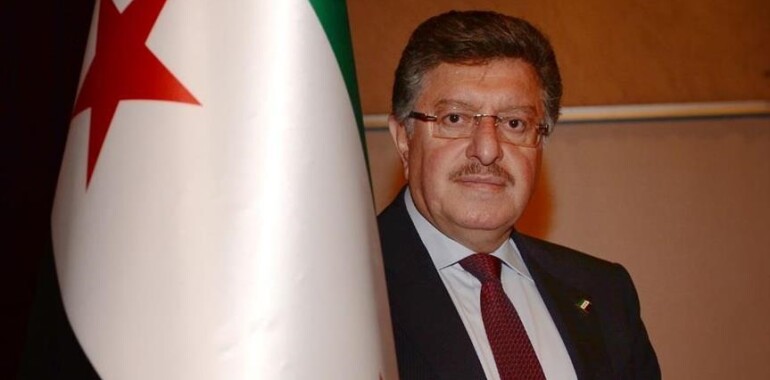In a move foreshadowed weeks ago, Salem al-Meslet was “elected” on Monday as president of the Opposition’s Syrian National Coalition. His election followed a period of political stagnation rooted in conflicts within the opposition’s most prominent institution.
Some downplayed the importance of the leader’s election, considering Meslet merely a new figurehead for the coalition after the rotation of positions that happened one year ago. Others praised the fact that Meslet comes from a supportive tribal background, “negotiating political experience and even-handed international relations.”
Popular opinion amongst Syrian revolutionaries evidenced no new hope stemming from the elections, which Nedaa Post forecast as a planned outcome about two weeks before it happened. On social media, some questioned what new impetus the new mandate could offer to the institution, which is riven by divisions that reflect regional and international differences.
Hopes for reform
Wael Alwan, a researcher at the Jusoor Center for Studies, said that driving the coalition toward progress on the Syrian issue is now very much linked to regional and international developments.
Alwan told Nedaa Post that, although it is not possible to move expansively, this “does not mean surrender” — especially with “good latitude within which the coalition can move.”
According to Alwan, broad latitude can allow “a lot of improvements and reforms within the coalition’s structure, and then at the level of the Syrian issue, both politically and internally.”
Read Also: Salem al-Meslet Elected Head of the Opposition Coalition
Alwan said that during his presidency of the coalition, Meslet must harness his personal qualities — as enhanced by his political experience in internal and regional relations — to address a large part of the inter-regional differences that have arisen recently within the coalition. Meslet must also manage the opposition body’s relationship with the international community.
“No change under the dominance of the Hawks”
Malik al-Hafiz, a researcher and writer at the Washington Institute for Near East Studies, said that the new leadership “cannot do anything” differently from its predecessors.
“The bloc controlling the coalition is the same, and maintains the same approach; it is not planning and implementing policies as an integrated political institution, with a clear project,” Hafiz told Nedaa Post.
“According to the information received, the establishment of successive political and presidential bodies follows a consensus between two factions within the coalition. Under this arrangement, each of the votes, members’ powers, and spheres of influence are shared, along with monthly salaries. These arrangements apply both to members of the political body and even within the specialized committees of the coalition’s general body,” Hafiz added.
Read Also: Campaign Against the Re-Election of the Head of the Negotiating Body
“Meslet came to assume the coalition’s presidency after a consensus was reached several months ago between the institution’s two factions, which are dominated by the coalition’s so-called hawks,” Hafiz added.
An influential figure and the structure itself
Alwan, who pointed to margins that allow the opposition to organize itself internally, said that the new leader was an “influential figure.” He also linked the change that has occurred to the opposition’s overall position, rather than one person alone.
“Meslet is a prominent influence in creating an environment for change, which can occur within the complexities of the international and regional landscape,” he said.
“Meslet will do nothing in his presidency of the coalition, except to write to the foreign ministries of some Western countries, issue some statements, and give some press conferences,” al-Hafiz assured. He added that change is not possible under the coalition’s current structure.
This article was translated and edited by The Syrian Observer. The Syrian Observer has not verified the content of this story. Responsibility for the information and views set out in this article lies entirely with the author.


